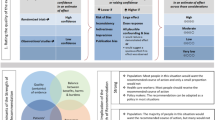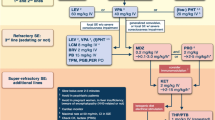Abstract
Background
Refractory status epilepticus (RSE) has a mortality of 16–39%; coma induction is advocated for its management, but no comparative study has been performed. We aimed to assess the effectiveness (RSE control, adverse events) of the first course of propofol versus barbiturates in the treatment of RSE.
Methods
In this randomized, single blind, multi-center trial studying adults with RSE not due to cerebral anoxia, medications were titrated toward EEG burst-suppression for 36–48 h and then progressively weaned. The primary endpoint was the proportion of patients with RSE controlled after a first course of study medication; secondary endpoints included tolerability measures.
Results
The trial was terminated after 3 years, with only 24 patients recruited of the 150 needed; 14 subjects received propofol, 9 barbiturates. The primary endpoint was reached in 43% in the propofol versus 22% in the barbiturates arm (P = 0.40). Mortality (43 vs. 34%; P = 1.00) and return to baseline clinical conditions at 3 months (36 vs. 44%; P = 1.00) were similar. While infections and arterial hypotension did not differ between groups, barbiturate use was associated with a significantly longer mechanical ventilation (P = 0.03). A non-fatal propofol infusion syndrome was detected in one patient, while one subject died of bowel ischemia after barbiturates.
Discussion
Although undersampled, this trial shows significantly longer mechanical ventilation with barbiturates and the occurrence of severe treatment-related complications in both arms. We describe practical issues necessary for the success of future studies needed to improve the current unsatisfactory state of evidence.

Similar content being viewed by others
References
Novy J, Logroscino G, Rossetti AO. Refractory status epilepticus: a prospective observational study. Epilepsia. 2010;51(2):251–6.
Holtkamp M, Othman J, Buchheim K, Meierkord H. Predictors and prognosis of refractory status epilepticus treated in a neurological intensive care unit. J Neurol Neurosurg Psychiatry. 2005;76(4):534–9.
Mayer SA, Claassen J, Lokin J, Mendelsohn F, Dennis LJ, Fitzsimmons BF. Refractory status epilepticus: frequency, risk factors, and impact on outcome. Arch Neurol. 2002;59(2):205–10.
Rossetti AO, Logroscino G, Bromfield EB. Refractory status epilepticus: effect of treatment aggressiveness on prognosis. Arch Neurol. 2005;62(11):1698–702.
Treiman D, Walton N, Collins J. Treatment of status epilepticus if first drug fails. Epilepsia. 1999;40(Suppl. 7):243.
Lowenstein DH, Alldredge BK. Status epilepticus. N Engl J Med. 1998;338(14):970–6.
Meierkord H, Boon P, Engelsen B, et al. EFNS guideline on the management of status epilepticus in adults. Eur J Neurol. 2010;17(3):348–55.
Claassen J, Hirsch LJ, Emerson RG, Mayer SA. Treatment of refractory status epilepticus with pentobarbital, propofol, or midazolam: a systematic review. Epilepsia. 2002;43(2):146–53.
Schor NF, Riviello JJ Jr. Treatment with propofol: the new status quo for status epilepticus? Neurology. 2005;65(4):506–7.
Holtkamp M. The anaesthetic and intensive care of status epilepticus. Curr Opin Neurol. 2007;20(2):188–93.
Bleck TP. Refractory status epilepticus. Curr Opin Crit Care. 2005;11(2):117–20.
Claassen J, Hirsch LJ, Mayer SA. Treatment of status epilepticus: a survey of neurologists. J Neurol Sci. 2003;211(1–2):37–41.
Holtkamp M, Masuhr F, Harms L, Einhaupl KM, Meierkord H, Buchheim K. The management of refractory generalised convulsive and complex partial status epilepticus in three European countries: a survey among epileptologists and critical care neurologists. J Neurol Neurosurg Psychiatry. 2003;74(8):1095–9.
Rossetti AO, Logroscino G, Milligan TA, Michaelides C, Ruffieux C, Bromfield EB. Status Epilepticus Severity Score (STESS): a tool to orient early treatment strategy. J Neurol. 2008;255(10):1561–6.
Rossetti AO, Reichhart MD, Schaller MD, Despland PA, Bogousslavsky J. Propofol treatment of refractory status epilepticus: a study of 31 episodes. Epilepsia. 2004;45(7):757–63.
Vasile B, Rasulo F, Candiani A, Latronico N. The pathophysiology of propofol infusion syndrome: a simple name for a complex syndrome. Intensive Care Med. 2003;29(9):1417–25.
Guidelines for epidemiologic studies on epilepsy. Commission on Epidemiology and Prognosis, International League against Epilepsy. Epilepsia 1993; 34(4):592–6.
Cereda C, Berger MM, Rossetti AO. Bowel ischemia: a rare complication of thiopental treatment for status epilepticus. Neurocrit Care. 2009;10(3):355–8.
Stecker MM, Kramer TH, Raps EC, O’Meeghan R, Dulaney E, Skaar DJ. Treatment of refractory status epilepticus with propofol: clinical and pharmacokinetic findings. Epilepsia. 1998;39(1):18–26.
Wessen A, Persson PM, Nilsson A, Hartvig P. Clinical pharmacokinetics of propofol given as a constant-rate infusion and in combination with epidural blockade. J Clin Anesth. 1994;6(3):193–8.
Bayliff CD, Schwartz ML, Hardy BG. Pharmacokinetics of high-dose pentobarbital in severe head trauma. Clin Pharmacol Ther. 1985;38(4):457–61.
Cordato DJ, Mather LE, Gross AS, Herkes GK. Pharmacokinetics of thiopental enantiomers during and following prolonged high-dose therapy. Anesthesiology. 1999;91(6):1693–702.
Parviainen I, Uusaro A, Kalviainen R, Kaukanen E, Mervaala E, Ruokonen E. High-dose thiopental in the treatment of refractory status epilepticus in intensive care unit. Neurology. 2002;59(8):1249–51.
Parviainen I, Uusaro A, Kalviainen R, Mervaala E, Ruokonen E. Propofol in the treatment of refractory status epilepticus. Intensive Care Med. 2006;32(7):1075–9.
Kress HG, Segmuller R. Intravenous anesthetics and human neutrophil granulocyte motility in vitro. Anaesthesist. 1987;36(7):356–61.
Iyer VN, Hoel R, Rabinstein AA. Propofol infusion syndrome in patients with refractory status epilepticus: an 11-year clinical experience. Crit Care Med. 2009;37(12):3024–30.
Acknowledgments
The study was supported in part by grants from the Swiss League against Epilepsy, AstraZeneca (Switzerland) and UCB (Switzerland). The six authors do not have any other financial disclosures or conflict of interest. The authors wish to thank Dr Jan Novy (CHUV Lausanne), Katherine Gleason, and Sonia Replansky (BWH Boston, MA) for their help in data acquisition, and Dr Nathan B. Fountain (Charlottesville, VA) for his inputs on the study design. We confirm that we have read the Journal’s position on issues involved in ethical publications and affirm that this report is consistent with those guidelines.
Author information
Authors and Affiliations
Corresponding author
Additional information
This study is dedicated to the memory of Edward B. Bromfield, MD (1951–2009), who greatly contributed to the study design, and was PI of the American side of the study until his death.
Appendix: Clinical Trials. Gov ID: NCT00265616
Appendix: Clinical Trials. Gov ID: NCT00265616
Recruiting Centers (randomized patients). Inselspital Berne, Switzerland, Drs. J. Mathis, A. Nirkko, M. Bertschi (5); Hôpitaux Universitaires de Genève, Geneva, Switzerland, Drs. P. Jallon, S. Vulliémoz, M. Seeck (2); Centre Hospitalier Universitaire Vaudois, Lausanne, Switzerland, Drs. A.O. Rossetti, J. Novy, C. Cereda, V. Rey, S. Jukopila, M.D. Schaller (10); Brigham and Women’s Hospital, Boston (MA), Drs E.B. Bromfield (deceased), J.W. Lee, T.A. Milligan (5); Massachusetts General Hospital, Boston (MA), Drs. A.J. Cole, C. Michaelides, B. Leeman (2).
Rights and permissions
About this article
Cite this article
Rossetti, A.O., Milligan, T.A., Vulliémoz, S. et al. A Randomized Trial for the Treatment of Refractory Status Epilepticus. Neurocrit Care 14, 4–10 (2011). https://doi.org/10.1007/s12028-010-9445-z
Published:
Issue Date:
DOI: https://doi.org/10.1007/s12028-010-9445-z




